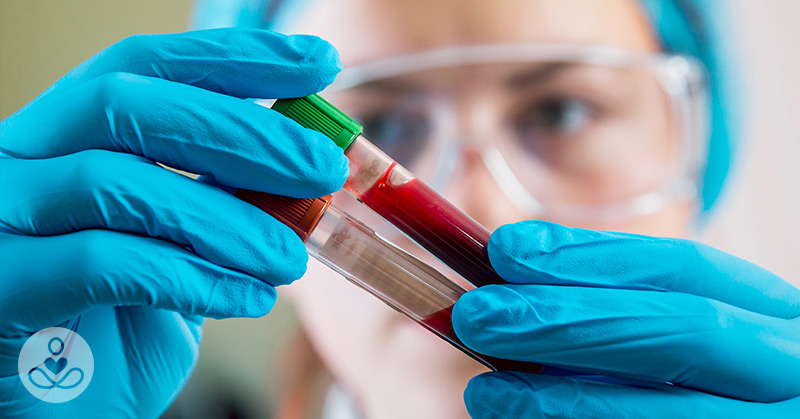Although our blood contains a huge amount of information, technology seems to be still catching up to what we can learn from this lifeforce.
In the past, blood tests could only reveal so much about the internal state of our bodies. Now, technology has and continues to emerge that allows us to get even more data from our blood—and the future holds even more potential.
These types of tests were not available even just five years ago. In fact, the Food and Drug Administration (FDA) only approved the first “liquid biopsy” in 2016 (to test for the cobas EGFR mutation in lung cancer patients) [1].
Liquid biopsy is the term used to describe blood that’s used as a type of biopsy to test for cancer, heart disease, depression, and even, current developing technologies might suggest, chronic pain and mental illness [2].
What conditions do blood tests have the potential to identify?
Cancer
Did you know that cancer can actually “shed” DNA into your blood? Technology that uses blood tests for cancer is already available and is continuing to develop. These tests have the potential to not only detect cancer but provide invaluable information to creating and monitoring a treatment plan based on the specific cell mutation that’s causing cancer [3].
There’s an available blood test used to detect colon cancer, although the information it can provide is somewhat limited as it’s not accurate for precancerous polyps at this time [4]. While the blood test can help detect colon cancer, this test alone can’t definitively determine whether cancer is present.
However, this technology is evolving and in the next five years specialists expect even more advances that could lead to blood tests that detect more types of cancers. We’ve already seen how a liquid biopsy can identify cancer DNA in lung cancer patients and be used to monitor the effectiveness of treatment as well [5].
Heart Attack
Blood tests can reveal a lot of information about your heart attack risk, such as elevated cholesterol, but nearly half of patients who experience heart attacks have normal levels of cholesterol [6].
Other blood tests can suggest a high risk, allowing people to adopt healthier habits to better manage this risk, but newer technology may allow for testing of genetic components that can be even more helpful in identifying people who are at high risk for heart attacks earlier in life [7].
While this specific technology may take a few years to develop, there are current blood tests available for C-reactive protein (CRP), an inflammation marker that may indicate future risk for heart attack. Other available tests include for cardiac troponin and ischemia-modified albumin (IMA), which could be indicative of a warning sign of a heart attack, but elevated levels still require further testing to determine if a problem is actually present [7].
With the coming blood tests for specific genetic factors, people may be able to know their heart attack risk much earlier and put steps in place to minimize their risk early on.
Mental Illness
There are currently no blood tests that can tell whether or not you have a mental illness such as depression. But our bodies respond to such conditions, as well as our brains. Research shows that even our immune systems are impacted by our mental health, and vice versa [8].
Blood tests are currently in the works to help detect certain genes that have been linked to mental health conditions. These tests are still a few years away, but they would potentially measure RNA molecules, which levels in the blood change along with changes in suicidal thoughts, according to research [9].
These tests are still being developed and are, of course, complex (evidence shows some markers in the blood to assess suicide risk vary according to gender). However, they may provide a better indicator of suicide risk and even pain and stress. Right now, physicians still need to rely on conversations with their patients to determine risk for mental illness or suicide.
Concussions
Previously, the only way to detect bleeding and swelling the brain from head trauma was from certain neurological tests and CT scans.
However, there are people who sustain serious injuries to the head that aren’t able to be detected with these methods, and these people may not get the help or treatment they need as a result.
Blood tests are changing all that. The FDA approved the first blood test for concussions in 2018 called the Brain Trauma Indicator [10]. This test is so far only approved for adults, but it can fill in the missing diagnostic tools for people who have serious trauma but not obvious enough to be seen on a scan or detected with neurological tests.
How does it work? The test measures two proteins (UCH-L1 and GFAP) in the brain that are released into your bloodstream within 12 hours of sustaining a head injury. The levels of these proteins can reveal brain injuries that don’t show up on CT scans, or they may allow people to skip a CT scan in some instances
The test results can accurately predict which people will have an injury that’s visible on a CT and which won’t. Results are available in 3-4 hours and can help people get the treatment they need.
What Will the Future Hold?
Future advances may reveal even more liquid biopsies that can help patients who are too weak or sick to provide traditional biopsies for serious illnesses such as cancer. As the blood tests we discussed here emerge, newer ones will likely follow, and soon other forms of testing such as CT scans may only be conducted on an as-needed basis rather than being the first choice for patients.
Sources
- https://www.fda.gov/drugs/resources-information-approved-drugs/cobas-egfr-mutation-test-v2
- https://www.menshealth.com/health/a27704588/blood-tests-cancer-heart-disease-pain-concussions/?fbclid=IwAR0gMlqzjuvlZiBv1a_i-lERFDQC53UDCvjOnVlvLqo6GRO5CoVHrSJ5Das
- https://www.fredhutch.org/en/news/center-news/2019/04/liquid_biopsies_hype_hope.html
- https://www.cancer.org/cancer/colon-rectal-cancer/detection-diagnosis-staging/how-diagnosed.html
- https://www.ncbi.nlm.nih.gov/pmc/articles/PMC5945687/
- https://www.onlinejacc.org/content/70/24/2979?_ga=2.154223992.1107034930.1560527499-1888825117.1560527499
- https://www.ahajournals.org/doi/full/10.1161/01.CIR.0000114134.03187.7B
- https://www.health.harvard.edu/newsletter_article/infection-inflammation-and-mental-illness
- https://psychcentral.com/news/2017/08/16/personalized-blood-tests-provide-better-way-to-predict-suicide-risk/124729.html
- https://www.fda.gov/news-events/press-announcements/fda-authorizes-marketing-first-blood-test-aid-evaluation-concussion-adults
- https://www.menshealth.com/health/a27704588/blood-tests-cancer-heart-disease-pain-concussions/?fbclid=IwAR0gMlqzjuvlZiBv1a_i-lERFDQC53UDCvjOnVlvLqo6GRO5CoVHrSJ5Das

